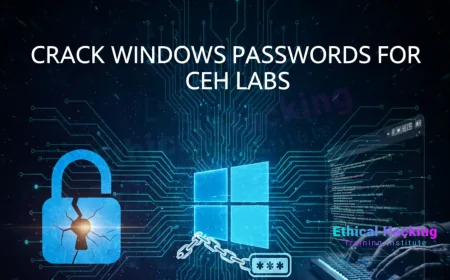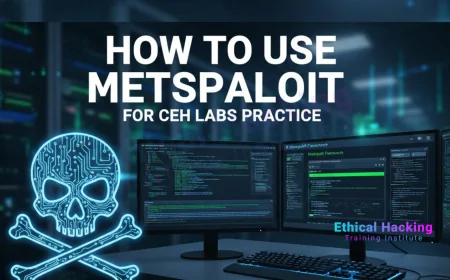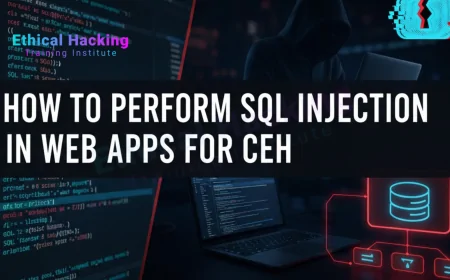Comprehensive OSCP Course Syllabus | Full PWK Training Breakdown Before You Enroll
Explore the complete OSCP course syllabus in 2025, including PWK modules, tools, and hands-on training details. Learn what you need to know before enrolling in OSCP certification.

Table of Contents
- What Is the OSCP Certification and Why Is It Valuable?
- Overview of the PWK Course: OSCP Training Foundation
- Full OSCP Course Syllabus Breakdown
- New Additions in OSCP 2025 Curriculum
- Who Should Enroll in the OSCP Course?
- How to Prepare for the OSCP Syllabus
- Common Tools and Platforms Used in OSCP Labs
- What to Expect from the OSCP Exam After Learning the Syllabus
- Benefits of Completing the OSCP Syllabus
- Conclusion
- Frequently Asked Questions (FAQs)
The OSCP (Offensive Security Certified Professional) certification is one of the most respected and challenging credentials in the cybersecurity industry. As aspiring ethical hackers look to upskill in 2025, understanding the complete OSCP syllabus before enrolling is crucial. This blog provides an in-depth look at what’s included in the Penetration Testing with Kali Linux (PWK) course, the official training for OSCP certification, and how to prepare strategically for it.
What Is the OSCP Certification and Why Is It Valuable?
The OSCP certification is designed for individuals who want to demonstrate their hands-on ability to identify and exploit security vulnerabilities. It’s not just a theoretical exam—it’s a 24-hour practical test where candidates must gain root access to systems and submit a detailed penetration test report.
Key Reasons Why OSCP Is Highly Regarded:
-
Industry recognition by employers globally
-
Real-world, hands-on hacking scenarios
-
Demonstrates deep technical and ethical hacking knowledge
-
Enhances opportunities in red teaming, penetration testing, and security consulting
Overview of the PWK Course: OSCP Training Foundation
The PWK course is the official curriculum for the OSCP exam. It has been revamped with AI-enhanced labs and more advanced exploitation content in recent years.
Core Features of PWK Course:
-
350+ pages of course material (PDF)
-
17+ hours of instructional video content
-
70+ lab machines in an isolated virtual network
-
AI-assisted practical learning tools (2025 edition)
-
Access to forums, student community, and support
Full OSCP Course Syllabus Breakdown
Here’s a structured overview of what you’ll study in the PWK course:
| Module | Topics Covered |
|---|---|
| 1. Introduction to Penetration Testing | Lab setup, Penetration testing methodology, Ethics |
| 2. Linux and Bash Essentials | Linux commands, scripting, permission models, Bash automation |
| 3. Windows Command Line Fundamentals | CMD scripting, privilege escalation basics, file operations |
| 4. Information Gathering | Active & Passive Reconnaissance, WHOIS, DNS, Nmap scanning, OS fingerprinting |
| 5. Vulnerability Scanning & Analysis | Nikto, OpenVAS, manual analysis of results, false positives |
| 6. Buffer Overflows | Fuzzing, SEH exploitation, writing custom exploits in C, Python |
| 7. Exploitation Basics | Manual exploitation, use of Metasploit, public exploits (Exploit-DB), AV evasion |
| 8. Privilege Escalation | Linux/Windows privilege escalation, kernel exploits, SUID misconfigs |
| 9. Password Attacks | Brute-force attacks (Hydra, Medusa), password spraying, hash cracking with John the Ripper, Hashcat |
| 10. Port Redirection and Tunneling | SSH tunneling, pivoting, proxychains |
| 11. Active Directory Attacks | Kerberoasting, Pass-the-Hash, exploiting misconfigurations in domain environments |
| 12. Web Application Attacks | XSS, SQLi, LFI/RFI, command injection, authentication bypass, Burp Suite usage |
| 13. Wireless Attacks (Optional) | WPA/WPA2 cracking, rogue access points (only covered in older PWK versions or community modules) |
| 14. Antivirus Evasion Techniques | Payload obfuscation, encoding, binary modification |
| 15. Client-Side Attacks | Social engineering, malicious documents, exploiting user interactions |
| 16. Bypassing Firewalls and Filters | IDS/IPS evasion, payload crafting |
| 17. Metasploit Framework | Custom payloads, module chaining, Meterpreter |
| 18. Post-Exploitation Techniques | Enumeration, maintaining access, data exfiltration |
| 19. Report Writing & Documentation | Professional penetration testing report writing, evidence capturing, attack narrative |
New Additions in OSCP 2025 Curriculum
As cybersecurity threats evolve, so has the OSCP syllabus. In 2025, the PWK course integrates:
-
AI-based lab feedback and scoring
-
Cloud penetration testing modules (beta)
-
Advanced AD privilege escalation labs
-
Updated tools and scripts compatible with new Kali Linux versions
Who Should Enroll in the OSCP Course?
You should consider enrolling in the OSCP course if you:
-
Have a foundational understanding of Linux and networking
-
Are familiar with scripting languages like Python or Bash
-
Want a practical, hands-on approach to penetration testing
-
Aspire to become a penetration tester, red teamer, or ethical hacker
How to Prepare for the OSCP Syllabus
Preparation Tips:
-
Start with basic Linux and networking fundamentals
-
Practice regularly with Capture The Flag (CTF) platforms
-
Use free tools like TryHackMe, Hack The Box, or OWASP Juice Shop
-
Build a home lab for hands-on testing
-
Focus on both offensive techniques and defensive awareness
Common Tools and Platforms Used in OSCP Labs
| Category | Popular Tools |
|---|---|
| Reconnaissance | Nmap, Netdiscover, Whois, theHarvester |
| Exploitation | Metasploit, Searchsploit, custom exploits |
| Password Attacks | Hydra, John the Ripper, Hashcat |
| Post-Exploitation | Mimikatz, PowerView, BloodHound |
| Web Attacks | Burp Suite, Nikto, SQLMap |
| Scripting | Python, Bash, PowerShell |
What to Expect from the OSCP Exam After Learning the Syllabus
Once you’ve mastered the syllabus:
-
You’ll face a 24-hour hands-on exam
-
You must exploit multiple machines and gain root/system access
-
Submission of a comprehensive report is required for passing
-
A score of 70/100 is needed to pass
Benefits of Completing the OSCP Syllabus
-
Globally recognized cybersecurity credential
-
Proves advanced technical ability
-
Qualifies you for job roles like Penetration Tester, Security Analyst, Red Teamer
-
Boosts credibility in interviews and client engagements
Conclusion: Get Ready for the Challenge of OSCP
The OSCP syllabus is not for the faint-hearted, but it offers one of the most practical and rewarding journeys in cybersecurity. With evolving modules, hands-on labs, and AI-driven feedback in 2025, preparing for the OSCP exam has become more dynamic and accessible—even remotely. Whether you're transitioning into cybersecurity or aiming to elevate your ethical hacking skills, mastering the OSCP syllabus is a powerful first step.
FAQs
What is included in the OSCP course syllabus?
The OSCP syllabus includes topics like information gathering, buffer overflows, privilege escalation, web exploitation, password attacks, and post-exploitation.
Is the OSCP syllabus updated for 2025?
Yes, in 2025 the OSCP syllabus includes AI-enhanced labs, cloud pentesting content, and updated exploitation tools.
How many modules are there in the PWK course?
There are around 19 structured modules in the PWK course, covering core penetration testing skills.
Does OSCP training cover Active Directory attacks?
Yes, the OSCP course includes modules focused on exploiting and enumerating Active Directory environments.
What tools are used in the OSCP syllabus?
Common tools include Nmap, Metasploit, Burp Suite, Hydra, John the Ripper, and BloodHound.
Are buffer overflow attacks part of the OSCP syllabus?
Yes, the syllabus includes in-depth training on stack-based buffer overflows and exploit development.
Do you learn web application hacking in OSCP?
Absolutely. The syllabus includes XSS, SQL injection, command injection, and authentication bypass techniques.
What scripting knowledge is needed for OSCP?
Basic knowledge of Bash, Python, and PowerShell is recommended and used in practical labs.
Is Linux essential to understand the OSCP syllabus?
Yes, Linux fundamentals are a must as many labs and tools run on Kali Linux.
Does OSCP include report writing skills?
Yes, report writing and documentation are covered, as submitting a professional report is mandatory for the exam.
Are there any wireless attacks in the OSCP syllabus?
Wireless attacks are optional and not emphasized in the latest versions of the PWK course.
Is the OSCP syllabus good for beginners?
It's ideal for those with basic cybersecurity knowledge; absolute beginners may struggle without prior preparation.
Does OSCP cover password cracking?
Yes, topics like hash cracking, brute-force, and spraying are covered using tools like Hashcat and Hydra.
Is Metasploit included in OSCP training?
Yes, Metasploit is part of the syllabus, though the focus is on manual exploitation.
Are cloud attacks part of the 2025 OSCP course?
Introductory modules on cloud exploitation have been introduced in the 2025 update.
Is AV evasion part of the OSCP syllabus?
Yes, it covers antivirus evasion and payload encoding techniques.
What kind of lab environment is provided in OSCP training?
Students access over 70 machines in a simulated, AI-enhanced virtual lab.
Are Windows systems included in OSCP labs?
Yes, both Windows and Linux targets are provided to simulate real-world networks.
Is privilege escalation part of OSCP?
Yes, both Windows and Linux privilege escalation techniques are core parts of the syllabus.
What penetration testing techniques are taught in OSCP?
Techniques include reconnaissance, scanning, exploitation, post-exploitation, and lateral movement.
Does OSCP include social engineering?
Basic client-side attacks such as document-based exploits are included, but not deep social engineering.
Do I need to know programming for OSCP?
You don’t need advanced programming, but basic scripting is highly beneficial.
How long does it take to complete the OSCP syllabus?
Most learners take 2 to 4 months depending on prior experience and daily study time.
Is the OSCP exam based on the syllabus?
Yes, the exam is based entirely on practical implementation of topics from the PWK syllabus.
Are post-exploitation techniques taught in OSCP?
Yes, topics like persistence, data exfiltration, and access maintenance are included.
Is there a final project or assessment in OSCP?
Yes, the 24-hour exam itself is a hands-on assessment and requires a penetration test report submission.
What certifications are similar to OSCP?
Similar certs include CEH, eCPPT, PNPT, and CRTO, though OSCP is more hands-on and rigorous.
Can OSCP syllabus be self-studied?
Yes, while the official PWK course is recommended, motivated learners can prepare through self-study and labs.
Are there practice labs for the OSCP syllabus?
Yes, over 70 machines are provided to simulate real penetration testing scenarios.
How often is the OSCP syllabus updated?
Offensive Security updates the syllabus periodically to reflect current threats and tools—most recently in 2025.
What's Your Reaction?
 Like
0
Like
0
 Dislike
0
Dislike
0
 Love
0
Love
0
 Funny
0
Funny
0
 Angry
0
Angry
0
 Sad
0
Sad
0
 Wow
0
Wow
0



















